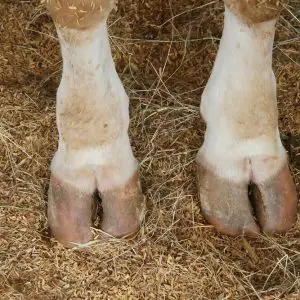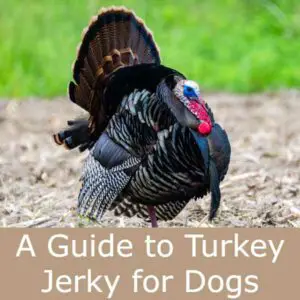Turkey jerky is a very popular choice for dogs as a treat or chew. Not only because of its catchy name but also because it is a high protein, low fat treat that is nutrient dense and full of flavour. When made from good quality meat, it is a very healthy snack for dogs.
Does turkey jerky seem too good to be true? Are there any downsides and is it safe to feed to our dogs? This article explores the pros and cons of using turkey jerky as part of your dog’s diet and will enable you to decide if it is appropriate for your dog.
Key facts
Turkey jerky treats are usually made from dehydrated turkey breast meat which is high in protein and low in fat. They are a natural product with no preservatives or additives.
Turkey jerky may help to improve dental health. They provide mental stimulation for dogs through the healthy habit of recreational chewing.
Turkey jerky is relatively low in calories, however, any additional treats in your dog’s diet will contribute to unnecessary weight gain if overfed.
Risks of feeding turkey jerky include bacterial contamination, choking, digestive irritation and gastrointestinal blockages. There is also an ongoing investigation currently into some jerky treats causing serious diseases in humans and animals including Fanconi- like syndrome.
Some popular alternatives to turkey jerky include beef jerky, dental chews, beef tendon chews, beef tail chews and bully sticks.
What Are Turkey Jerky Treats for Dogs
Turkey jerky is a lean cut of meat (usually turkey breast) which has had the fat removed and has been slowly dehydrated. Turkey jerky provides an easily digestible protein which is very low in fat. Turkey jerky and other jerky products including beef jerky are popular snacks used by humans as well as dogs.
It is important to recognise that turkey jerky for humans and turkey jerky for dogs are very different products. Turkey jerky for humans is not suitable for dogs. It usually contains high amounts of salt or sugar and may be flavoured with things that are toxic to dogs such as onions and garlic. In this article, the only jerky discussed will be the turkey jerky specifically made for dogs. This type is usually 100% natural and contains no additives, flavourings, or preservatives.
Turkey jerky usually comes in thin strips which can be approximately 5cm – 10cm long and varying widths.
Provenance
Turkey jerky treats are usually made from dehydrated turkey breast strips. Some other jerky products are made from by-products of animal carcasses but turkey jerky is usually just made from breast meat. This is a more expensive cut of meat compared to some of the other rawhide chews available on the market which are made from by-products not intended for human consumption.
It is important to bear in mind that animal welfare and food safety standards will vary greatly depending on the country of origin. Look for products which have been approved by associations such as
Scottish Organic Producers Association.
When choosing a jerky product for your dog, try to choose local products where possible to reduce the carbon footprint. The UK produces a high amount of turkey meat. Most UK supermarkets source their turkey meat from British farms rather than importing meat. The biggest producer of turkey in the UK is Bernard Matthews Turkey Farm.
Preparation
Turkey jerky treats usually come as thin strips of dried meat, or a stick involving a few strips twisted together. They are normally air-dried slowly. They are very versatile as they come in various different sizes. This means they can be fed to small, medium or large breed dogs. They don’t usually contain any salt, sugar or other flavourings. They are available for purchase online, in good pet shops and some supermarkets.
Raw feeding
Did you know?
Turkey jerky can be used as part of a raw feed diet for your dog. Due to the way the jerky is dehydrated, with low temperatures being used, it means the products are still classed as raw. As with any raw food – there are a few things owners need to be aware of. Thorough hand-washing practices should always be adhered to. When handling and preparing the jerky, all equipment and surfaces need to be sanitised properly afterwards with appropriate cleaning products. This is due to the fact that raw food carries a risk of contamination from potentially harmful bacteria. The main offenders are Campylobacter, Listeria, E coli and salmonella. These pathogens don’t always cause disease in dogs, however, they can easily be passed onto any vulnerable humans coming into contact with the dog or the product. This includes anyone who is immunosuppressed, young children and the elderly.
Benefits of Turkey Jerky for Dogs
Key benefits
Mental Stimulation
Easily digestible and highly palatable, encourages recreational chewing behaviour.
Dental Health
May encourage mechanical debridement of plaque and tartar from teeth.
Hypoallergenic
Single source of protein and 100% natural product.
Nutritional Benefits
High protein and full of essential vitamins and minerals.
Mental Stimulation
Larger pieces of turkey jerky can be used to encourage healthy recreational chewing habits for your dog. This provides important mental stimulation for them. Dogs learn vital life skills such as hunting and scavenging by chewing.
It is in their nature to do so, especially as young puppies. If you provide your dog with something safe to chew, it will also save your furniture or slippers from getting destroyed! Chewing is thought to aid in relieving stress in dogs too. Smaller pieces of turkey jerky can be used as a high-value treat while training your dog as a positive reward.
Dental Health
Chewing turkey jerky is believed to be able to mechanically debride your dog’s teeth, removing tartar and plaque and encouraging saliva production. Although this is widely believed to be a benefit of this type of treat, there is no concrete evidence to support this currently.
It is recommended that you follow guidance from your vet on dental care and clean your dog’s teeth regularly, whilst keeping up to date with dental health checkups.
Hypoallergenic
Some dogs have allergies to certain food products. Some dog foods contain trace elements of lots of different proteins. If your dog is allergic and does react, this can mean that it is very difficult to find food or treats that are safe for them to eat.
As long as you know that your dog isn’t allergic to turkey meat, you can safely feed turkey jerky and know that it will not trigger an allergic reaction as these treats are 100% turkey with nothing else added in.
Nutritional Benefits
Turkey jerky is a healthy and nutrient-dense treat option. It is easily digestible and a brilliant source of protein. It is low in fat compared to a lot of the other rawhide treats as well. Turkey is a good source of magnesium, phosphorus and zinc too for your dog.
Nutritional Information for Turkey Jerky for Dogs
Typical Nutrition Composition of Turkey Jerky
Note: The percentages may not add up to 100% as they are averages from several data sources. Ranges are given when there is a wide variation between products. Find out more about how we calculate nutritional information >>
Be aware the nutrition will vary depending on different manufacturers, batches and the preserving method used.
Protein content
Turkey jerky treats are usually dried breast meat. This means they are very high in protein. Protein contains essential amino acids which are required for healthy muscles, tendons, ligaments and other connective tissues. They are also responsible for the production of enzymes and hormones and are involved in the maintenance of healthy coats and skin.
Developing puppies have additional protein requirements, however, if they are being fed a good complete puppy food they should not require additional protein from an alternative source. Very high protein foods should be approached with caution in dogs suffering from kidney or liver issues as this may exacerbate their condition. Always consult your vet before adding treats to your dog’s diet.
Fat content
Turkey jerky is relatively low in fat. Low-fat treats are helpful when feeding overweight dogs, or dogs that suffer from pancreatitis or diabetes. The amount of fat does vary greatly. Breast meat is very low in fat, but dark turkey meat has a higher fat content.
Treats higher in fat are more likely to cause weight-related health issues, including unwanted weight gain. This in turn can contribute to joint damage, cardiovascular issues and problems with the intestinal tract and pancreas. Always check the nutritional information on the label before purchase to ensure the fat content is not too high.
Vitamins, minerals and Compounds
Vitamins and minerals
Magnesium – important in the function of enzymes and the transportation of nerve impulses between muscles and nerves. Also important for healthy skin and coat.
Zinc – important for the maintenance of healthy skin and coat, enzyme and hormone function and the immune system.
Phosphorus – combines with calcium to facilitate healthy bone strength, growth of muscles and healthy teeth.
Potassium – important for the regulation of appetite and energy.
Iron – aids in the transportation of oxygen in the bloodstream to supply it to vital organs and muscles.
Vitamin B6 – vital for the production of glucose, regulation of hormones and facilitating gene activation.
Vitamin B2 – involved in the metabolism of carbohydrates and amino acids.
Vitamin B3 – also known as niacin, supports metabolic reactions in mammals. It is vital for the production of energy and the digestion of proteins and carbohydrates.
Calories
Do Not Overfeed
Turkey jerky is relatively high in calories. However, it is usually fed in very small pieces, especially compared to other natural chews such as pig ears or beef tails. A small section of turkey jerky used as a training reward will usually amount to approximately 30-40 calories per piece.
The size of your dog and their exercise level as well as any health issues affecting their metabolism, all dictate how many calories they should consume in one day. Speak to your vet about calculating your dog’s energy requirements and whether different size treats can be incorporated into their diet.
Feeding Guide
Turkey jerky should always be used as a treat or training reward, not to replace complete dog food. They should be used to complement your dog’s diet and consideration should be taken to reducing your dog’s main meal if feeding treats regularly.
Dogs should always be supervised when feeding any type of rawhide chew products and they should always have access to fresh water while chewing. A small section of jerky should be used per day for small-breed dogs. Larger breeds may be more suited to have 2 – 3 treats per day depending on their size and energy requirements.
Downsides & Risks of Turkey Jerky for Dogs
May Pose Risks
Turkey jerky may pose a choking hazard to your dog, it can sometimes cause intestinal irritation or blockage. All raw food products come with a risk of bacterial contamination. There is an ongoing investigation into serious illnesses caused by some jerky products (not currently turkey jerky) but the underlying cause has yet to be identified.
Choking Hazard
All rawhide treats are a potential choking hazard. The risk is increased if treats which are an inappropriate size are fed to dogs, or if your dog is an avid chewer that would potentially inhale parts of the chew. Turkey jerky can be broken into smaller pieces for smaller dogs but the pieces may still be sharp or pointed and may become lodged in your dog’s throat. This is one of the reasons why it is so important to supervise your dog when eating.
Bacterial Contamination
As with all raw food products, there is a risk of bacterial contamination with turkey jerky. Some of the bacteria may not harm your dog, but it may cause significant disease in vulnerable humans in contact with the dog or the treats. These include babies, the elderly and anyone who is immunosuppressed.
Extra precautions need to be taken when handling these products, including astringent hand washing practices and cleaning down of utensils and surfaces used. If there are vulnerable individuals in your household, it is best to avoid these raw products altogether to minimise the risk. The bacteria usually isolated include Campylobacter, E. coli, salmonella, and Listeria.
Fanconi-like syndrome
Since 2007, there have been reports of illnesses in pets thought to be linked to the consumption of jerky food products. This is currently an ongoing investigation with the FDA (U.S. Food and Drug Administration)
There have been over 5000 cases of illness in dogs, cats and humans and over 1000 deaths associated with the consumption of jerky products. Most of these cases were related to chicken, but beef, duck and sweet potato treats were also linked. There hasn’t been any linked to turkey jerky yet but chicken jerky is very similar. It is believed that many of these treats came from China.
The symptoms described included vomiting, diarrhoea and skin lesions, as well as something called Fanconi-like syndrome. This is a disease that affects the kidneys causing them to let important nutrients pass freely into the urine. Currently, it is not known why jerky treats have caused these symptoms.
There have been many tests carried out but none have come to any concrete conclusions. For this reason, it is impossible to say if certain brands of jerky are safe or not, so some pet owners do avoid jerky altogether. Despite the numbers mentioned above being alarmingly large, the number of animals and humans that consume jerky products each day and have no adverse effects is much greater. The general advice currently is to avoid chicken-based jerky products and ensure the country of origin is stated on the packet clearly.
Digestive Irritation
Some dogs react to certain food products and treats. It may be that they are allergic or it could just be they have a low tolerance for certain treats. Each individual is different. Some dogs may experience vomiting and diarrhoea if they eat too many turkey jerky treats for example, but they may have no adverse effects when eating smaller amounts.
When first feeding your dog turkey jerky, cautiously feed small pieces and monitor your dog for any signs of a reaction before giving any more.
Gastrointestinal Obstruciton
If your dog is chewing large pieces of turkey jerky, some segments can become very sharp and pointed and may cause an injury to your dog’s gastrointestinal tract when swallowed. It is rare, but sometimes food material that is swallowed can become lodged in the gut, or perforate it completely. If this occurs, your dog will become very poorly very quickly.
Signs to look out for include – vomiting, diarrhoea, inappetence, lethargy and abdominal pain. If you think your dog may have an obstruction or any other issue with their gut, seek veterinary attention immediately. Always feed your dog chews and treats that are appropriate for their size, supervise them at all times and allow them to have access to fresh water while they eat.
Avoid If…
- Your dog has a known allergy to turkey
- Your dog is overweight as adding extra treats to their diet will contribute to unwanted weight gain
- Your dog suffers from diabetes or pancreatitis flare-ups or other gastrointestinal issues
- Your dog is an avid chewer and will try to swallow large segments or swallow the treat whole
- Your dog has liver or kidney disease
- Your dog is immunosuppressed in anyway
Turkey Jerky for Puppies

Most manufacturers recommend feeding turkey jerky to puppies from 16 weeks of age. As with all treats, turkey jerky should be fed in moderation to your puppy and should not be used to replace any part of their normal puppy food. This should be a complete puppy food appropriate for your dog’s breed and size. Puppies should always be supervised when feeding chews. Large chews need to be broken up into 2 or 3 pieces and only fed once or twice a week. Turkey jerky treats are often enjoyed by puppies when they are teething. They provide mental stimulation and encourage healthy recreational chewing habits.
Alternatives to Turkey Jerky for dogs
- Beef Jerky Chews: These chews are very similar to turkey jerky chews but they are made from cuts of beef. They can be useful if your dog is allergic or reacts to turkey but you are still seeking a high-protein, low-fat treat.
- Beef Tail Chews: These chews contain cartilage, bone, tendon and fat. They provide an interesting texture which dogs seem to enjoy. They are a good source of glucosamine and chondroitin.
- Bully Sticks: These are thin, long chew treats that are made from the inner tendon of the penis of a bull which has been dehydrated. They are very popular with dogs due to their palatability, although they do have a strong smell which some owners do not tolerate.
- Beef Tendons: These are one of the softer chew options, they are easily digestible. They are less likely to splinter than some of the similar products on the market, They are handy for elderly dogs that might have dental issues as they are softer therefore more gentle on the teeth and gums. A popular choice for teething puppies as well.
- Edible Dental Chews: There is a very large market for dental chews. They are usually made from potato starch which then has flavour added. Some owners steer clear of these as they aren’t 100% natural once the flavours and preservatives have been added. As there is such a big variation between brands, it is important you pick a product approved by the Veterinary Oral Health Council. They have a useful list on their website. Dental chews can be very beneficial for your dog’s dental health but they are often very calorific so be careful not to overfeed them to your dog.
FAQs
Turkey jerky treats are very good for dogs. They contain a very high amount of protein and comparatively low amounts of fat which means they are a nutrient-dense and healthy treat choice for your dog. It is important to factor in treats as part of your dog’s daily calorie allowance to prevent unwanted weight gain from occurring.
There are still investigations being carried out into the safety of jerky-type treats for dogs after there being a large number of cases of illnesses reported since 2007. Most of these treats were from chicken meat and supplied from China. Lots of owners avoid chicken jerky and products from this country and view jerky as being safe, however, the underlying cause of these illnesses reported has not been identified. This means it is currently difficult to say if jerky treats are 100% safe for dogs.
Dogs do tend to like turkey jerky treats. They have a mild odour that dogs are very attracted to. They are highly palatable and easily digestible.
This largely depends on your dog’s size and breed and how active they are. If they are a large breed dog with no health issues that is moderately active, two to three turkey jerky treats per day will be a sufficient amount. Smaller dogs may only require one or two treats per day. If you need help calculating your dog’s energy requirements consult your vet who will be able to help you
Compared to other rawhide treats on the market, turkey jerky does not last very long. Turkey jerky is usually made from breast meat which is easy to chew up quickly. Compared to treats such as beef tail chews which contain hard cartilage, tendon and bone and take much longer to chew up and swallow. The amount of time your dog takes to chew turkey jerky will largely depend on their breed and size.
Unfortunately, turkey jerky treats can cause blockages if parts of the treat get lodged along the gastrointestinal tract. If your dog is an avid chewer or attempts to swallow pieces whole, this is more likely to occur. Always supervise your dog when giving chew treats.
Turkey jerky treats don’t tend to have a strong odour compared to some of the other raw hind chews on the market, so generally are not unpleasant to keep in the house. Beef pizzle sticks and beef gullet chews are said to carry a strong odour that some owners won’t tolerate.








